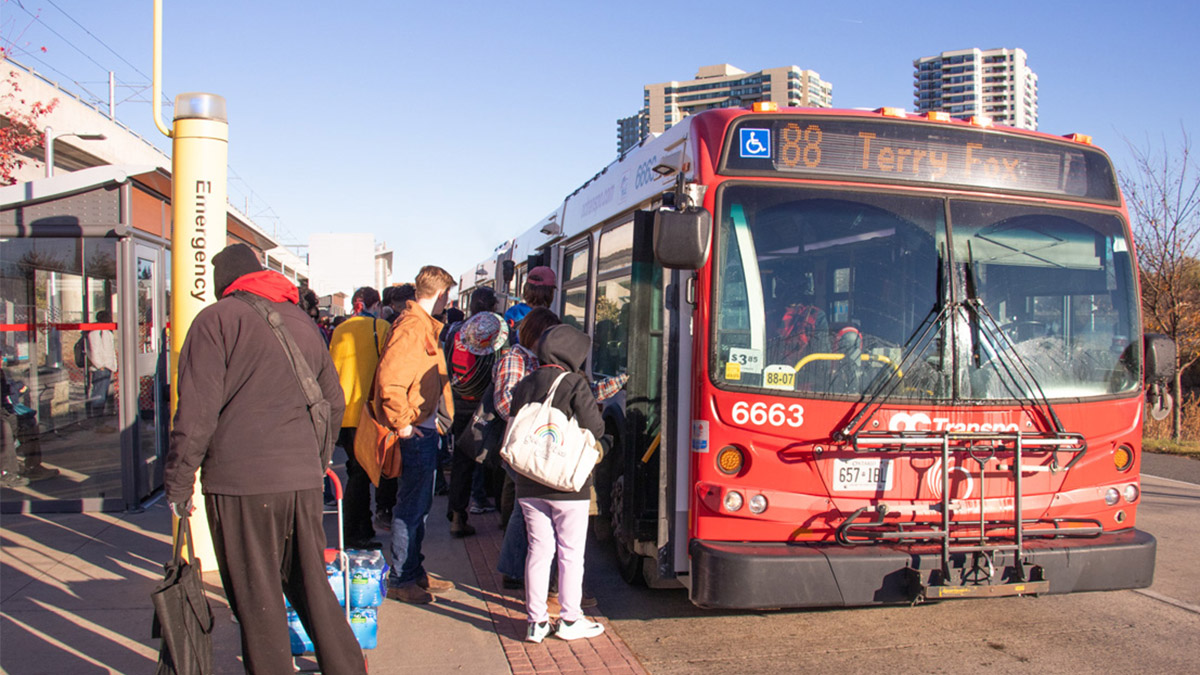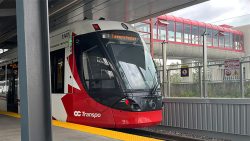Chronically late buses, an ever-shifting opening date for the long-delayed Trillium Line, serious deficits and irate transit passengers appearing at committee meetings are just some of the pressing issues OC Transpo has been dealing with over a challenging year.
Looming over it all is a projected $120 million deficit for 2025 that may require a variety of less-than-appealing solutions such as hiking transit fares by up to 75 per cent, depending on what the city receives in funding from federal and provincial governments.
For months now, Ottawa Mayor Mark Sutcliffe has pushed his “Fairness for Ottawa” campaign calling for a “fair share” of federal and provincial funding.
Sutcliffe struck a $540 million “new deal” with Ontario Premier Doug Ford in March, which would see the province take over responsibility for some roads and highways and support new policing in the ByWard Market, and earlier this month, he sat down for a “fireside chat” with Ford during which it was announced that $48 million of that funding would partly go towards transit safety.
The same day Capital Current caught up with Ford at Carleton University to ask if the province is considering offering specific operational funding for OC Transpo.
“Well, we’re discussing that. We had a good discussion today with the mayor,” said Ford. “Stay tuned.”
This year is one of the most pivotal for OC Transpo, says River Ward Coun. Riley Brockington, who has made transit a central issue in his time on council.
“I will never stand down from my focus on public transit. It is just such a key piece to a functional city,” he said, adding that residents were promised a world-class LRT system that has simply faltered in its delivery. “The people of Ottawa have been put through a lot in the last decade.”
Bus service was hobbled during construction of the LRT, which was eventually beset with derailments, cracked wheels, maintenance delays, electrical issues, chaos caused by freezing rain and other issues.
“So, while we had the worst of the worst of the LRT problems, our bus service got even worse. We just did not have bus capacity to meet the number of runs and routes that exist in the city,” says Brockington, a member of the city’s Transit Commission.
According to OC Transpo, “service regularity” for all frequent bus routes was 82 per cent in the spring 2024 (April 21 to June 29). Service regularity measures how often headways (the duration between consecutive buses of the same route and direction) fall within an acceptable range. Service is deemed regular if it deviates no more than 40 per cent from the scheduled headway. Route 88 Hurdman, for example, is scheduled to stop at Algonquin College at 11:31 a.m. and 11:46 a.m., or 15 minutes apart. If the bus scheduled for 11:46 arrives within the 40 per cent range, or six minutes, it is deemed regular.
A Transit Services spokeswoman warns that there are limitations in comparing routes.
“Routes have different characteristics, such as varying amounts of mixed traffic, length, on-street parking and transitway service, there is a certain qualitative dimension when assessing performance of a bus route,” Katrina Camposarcone-Stubbs, Public Information Officer, Transit Services, wrote in an email.
At the same time, COVID-19 caused “massive disruptions” and a significant reduction in ridership, according to the city’s Transportation Trends report released this summer. For example, the total number of people with transit passes decreased 12 per cent between 2011 and 2022. Those numbers are recovering but continue to be impacted by factors like the numbers of federal employees now working at least partly from home.
It remains uncertain how long-term those impacts are. Part of the reason is that OC Transpo deliberately stopped collecting metrics during the first phase of LRT construction, says Brockington.
Though the LRT has now stabilized and new bus drivers have been hired, the root causes of unreliability still have to be addressed, such as legacy route delays because of road construction, a lack of bus lanes on major arteries and “unrealistic schedules that just don’t meet reality,” said Brockington.
The issue of reliability was raised during a September transit commission meeting by student representatives from Carleton University and the University of Ottawa.
Dissatisfaction with OC Transpo’s services has “skyrocket[ed] to the point where I’m now concerned for the future of the relationship between our two institutions,” said Delphine Robitaille, president of uOttawa’s students’ union. The university’s U-Pass program with OC Transpo is worth roughly $19 million a year.
Carleton University Students’ Association Associate Vice-President Aidan Kallioinen told a Transit Commission meeting in September that students cannot depend on OC Transpo for a timely commute, despite collective student U-Pass payments topping $12 million last year.
More than 30 delegations made presentations, with concerns that ranged from a decision to save $600,000 by reducing the Confederation Line’s peak service frequency down from once every five minutes to once every 10 minutes, to the planned rescheduling of bus routes once the LRT’s Trillium Line finally begins service.
Brockington says at times his focus on reliability is at odds with the priorities of OC Transpo’s general manager Renée Amilcar.
“Her main focus is making sure the buses run,” he said. “I’m saying we can chew bubble gum and walk at the same time.”
Reliability is crucial — in addition to making sure a bus meets its scheduled runs — because it’s unacceptable to expect people to plan their lives around chronically late buses, Brockington says, adding that there’s no “secret sauce” to running an efficient transit system and the way to fix it is clear.
“Can you look at sections of the arterial road where we give bus priority at intersections? Is the route too long? Does the route need a more realistic timeline at rush hour? You add in more time to the schedule just to make it more realistic so people can plan accordingly, those types of things,” he said.
Amilcar declined to comment, but Camposarcone-Stubbs stated via email that “OC Transpo is committed to providing the public with clear and transparent updates about the challenges impacting our transit system, and the solutions to address them.”
On Tuesday at the meeting of the Transit Commission the 2025 draft transit budget was passed with a recommendation for a smaller fare hike for seniors.
If finally adopted, the budget will see a five per cent fare increase and an eight per cent hike to the transit levy. The original draft budget included a 120 per cent increase to the monthly pass for seniors.
Councillors presented two motions to reduce the fare hike, one would increase fares by 60 per cent and another would set the seniors’ pass at $58.25 per month, an 18 per cent fare increase. Both will go forward to full council on Dec. 11.




